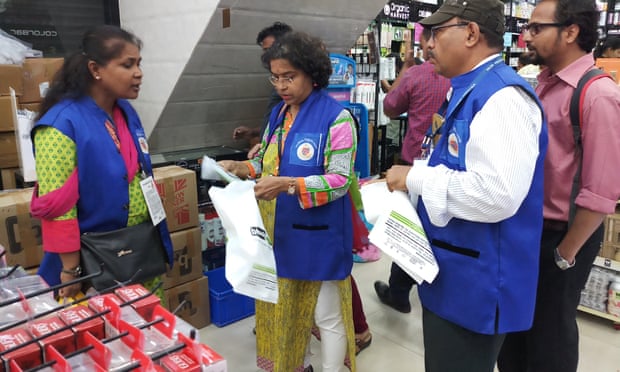- UID
- 20
- Online time
- Hours
- Posts
- Reg time
- 24-8-2017
- Last login
- 1-1-1970
|
Shopkeepers and vendors fear a hefty fine from inspectors who are tasked with keeping the Indian city free of plastic bags

Mumbai’s ‘blue squad’ enforce the ban on plastic bags. Photograph: Amrit Dhillon
▼ At 10am on a muggy October morning, Crawford Market, one of Mumbai’s oldest, is stirring into life.
In a first floor office inside the complex, the feared “blue squad” has assembled, forming a semi-circle around their boss, Anand Shinde, who is pumping them up. At 10.30am, the phalanx, dressed in blue uniforms, hurries down the wooden staircase and hits the streets around the market. Their target: shopkeepers and street vendors using plastic bags.
The blue squad – middle-aged and greying – may not look intimidating but their weapon, a hefty 5,000 rupee (£52) fine, has reduced grown men to begging, they say. They move swiftly, striding into shops, rifling under the counter and, if they find plastic bags, impos a fine on the shopkeeper.
“No questions. No excuses. We don’t accept any bullshit. The fine is immediate and paid in cash on the spot,” says squad member Annie George sternly. “However, our goal is not to punish, but to make people aware. We met street hawkers and told them, don’t do it for us, do it for your children.”
From Starbucks and McDonalds to tiny street food stall owners, no one is exempt from the ban on single use plastic, introduced on 30 June by the authorities in the state of Maharashtra and in Mumbai, its capital.Our goal is not to punish but to make people aware. Don’t do it for us, do it for your children
Annie George
The ban was prompted by vast quantities of plastic rubbish clogging up the already blocked drains during this year’s monsoon. Most other Indian cities are scarred by mountains of plastic, but Mumbai, with its 20 million people concentrated in a tiny island, experiences near-catastrophic disruption during the monsoon when sewers and drains fail to cope with the rain.
The ban prohibits the use of plastic bags, disposable cups and plates, and bottles under a certain size.
A walk through Crawford Market shows that some shopkeepers have either switched voluntarily to paper bags or learned the hard way. “It hurt me to pay that massive fine. I was upset for days,” says dried fruits seller Zahir Hussain.
In Colaba, a popular street market, Varun Seth has discarded the plastic pouches he used to wrap jewellery in favour of tiny paper bags. On the roadside next to him, a vendor wraps fruit in newspaper – not so easy. “It’s difficult for customers to carry fruit home this way but if that’s the law then I guess it’s for our own good and that of our children,” he says. (▪ ▪ ▪)
► Please, read the full note here: Source |
|